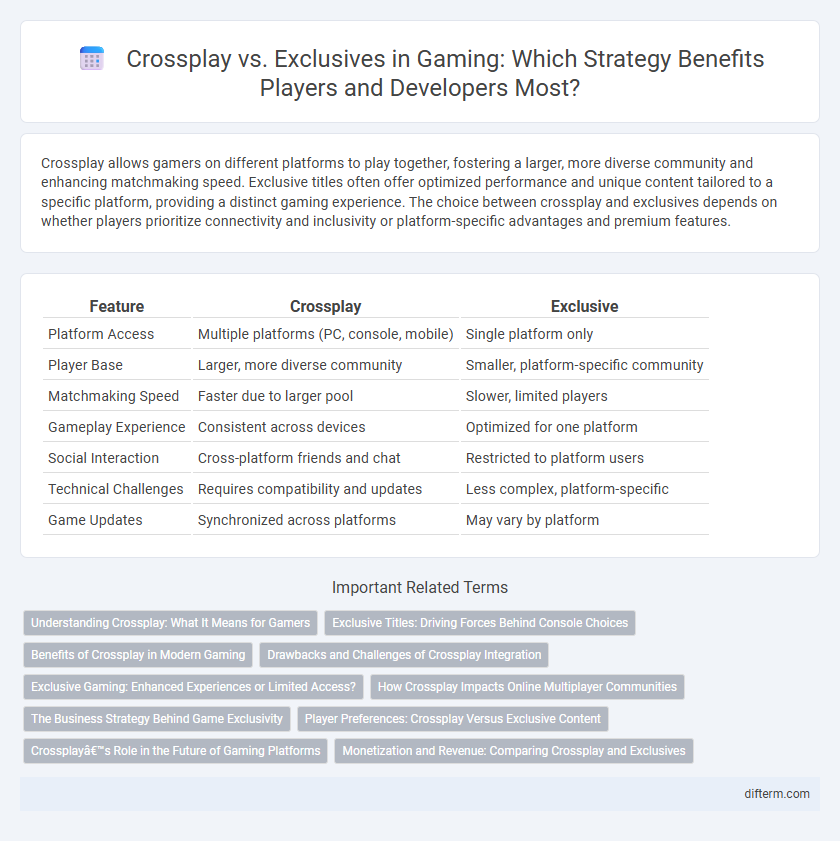Crossplay allows gamers on different platforms to play together, fostering a larger, more diverse community and enhancing matchmaking speed. Exclusive titles often offer optimized performance and unique content tailored to a specific platform, providing a distinct gaming experience. The choice between crossplay and exclusives depends on whether players prioritize connectivity and inclusivity or platform-specific advantages and premium features.
Table of Comparison
| Feature | Crossplay | Exclusive |
|---|---|---|
| Platform Access | Multiple platforms (PC, console, mobile) | Single platform only |
| Player Base | Larger, more diverse community | Smaller, platform-specific community |
| Matchmaking Speed | Faster due to larger pool | Slower, limited players |
| Gameplay Experience | Consistent across devices | Optimized for one platform |
| Social Interaction | Cross-platform friends and chat | Restricted to platform users |
| Technical Challenges | Requires compatibility and updates | Less complex, platform-specific |
| Game Updates | Synchronized across platforms | May vary by platform |
Understanding Crossplay: What It Means for Gamers
Crossplay allows gamers on different platforms like PlayStation, Xbox, and PC to play together, breaking down barriers and expanding multiplayer communities. This feature promotes inclusivity and improves matchmaking by increasing the player pool, resulting in faster and more balanced games. Exclusive titles limit gameplay to one platform, often offering optimized experiences but restricting social connection and competitive diversity across devices.
Exclusive Titles: Driving Forces Behind Console Choices
Exclusive titles such as "The Last of Us" and "Halo" play a crucial role in shaping consumer preferences by offering unique gaming experiences unavailable on other platforms. These exclusives often drive hardware sales, as gamers seek access to premier content optimized for specific consoles like PlayStation or Xbox. The appeal of exclusive games creates a competitive edge in the market, emphasizing the importance of proprietary franchises in console choice decisions.
Benefits of Crossplay in Modern Gaming
Crossplay bridges multiple gaming platforms, enabling players on consoles, PCs, and mobile devices to compete and collaborate seamlessly, expanding multiplayer communities and reducing matchmaking times. It enhances social connectivity by allowing friends to play together regardless of their chosen hardware, fostering a more inclusive and diverse gaming environment. The integration of crossplay also drives game longevity and developer support through broader user engagement and consistent content updates across ecosystems.
Drawbacks and Challenges of Crossplay Integration
Crossplay integration faces challenges such as balancing gameplay mechanics across different platforms, which can create competitive disparities and frustrate players. Technical difficulties arise from ensuring seamless compatibility and stable matchmaking among various hardware and network infrastructures. Security concerns also increase, as cross-platform interactions can expose games to higher risks of cheating and account hacking.
Exclusive Gaming: Enhanced Experiences or Limited Access?
Exclusive gaming titles often deliver enhanced experiences by optimizing gameplay, graphics, and storylines specifically for a single platform, leveraging its unique hardware capabilities. However, this exclusivity limits access, preventing cross-platform players from joining, which can fragment the gaming community and reduce multiplayer engagement. The choice between exclusive and crossplay games impacts user experience, community size, and overall game accessibility.
How Crossplay Impacts Online Multiplayer Communities
Crossplay significantly expands online multiplayer communities by enabling players from different platforms to compete and collaborate, thereby increasing matchmaking speed and diversity. This inclusivity reduces player segregation caused by platform-exclusive titles, fostering a unified gaming ecosystem and enhancing player engagement. Competitive balance adjustments and cross-platform communication tools further optimize the multiplayer experience, promoting long-term community growth and retention.
The Business Strategy Behind Game Exclusivity
Game exclusivity leverages platform-specific audiences to drive console sales and subscription service growth, creating a competitive advantage for developers and publishers. Crossplay broadens the player base and enhances community engagement but can dilute brand loyalty and reduce the perceived value of exclusive content. Strategic exclusivity deals often involve financial incentives from platform holders, aligning with long-term revenue goals while maintaining competitive differentiation in the gaming market.
Player Preferences: Crossplay Versus Exclusive Content
Player preferences in gaming often hinge on crossplay capabilities versus exclusive content, with many gamers valuing the ability to play seamlessly across platforms for broader community interaction. Exclusive content appeals to players seeking unique in-game items, storylines, or competitive advantages tied to a specific console or ecosystem. Balancing crossplay features with exclusive content influences player loyalty, engagement rates, and overall satisfaction within varied gaming communities.
Crossplay’s Role in the Future of Gaming Platforms
Crossplay enhances player engagement by enabling users on different gaming platforms such as PC, Xbox, and PlayStation to compete and collaborate seamlessly, breaking down traditional hardware barriers. This interoperability fosters larger, more vibrant online communities and extends the lifespan of multiplayer titles. As the gaming industry pivots toward inclusivity and accessibility, crossplay is becoming a crucial feature driving platform evolution and user retention.
Monetization and Revenue: Comparing Crossplay and Exclusives
Crossplay enhances monetization potential by expanding the player base across multiple platforms, driving higher in-game purchases and subscription revenues through broader accessibility. Exclusive titles rely heavily on platform-specific sales and unique content, often commanding premium pricing and enticing high-value consumers within a controlled ecosystem. Data from leading industry reports shows crossplay games average a 25% higher revenue growth rate due to diversified audience engagement compared to exclusive releases.
crossplay vs exclusive Infographic

 difterm.com
difterm.com